Here’s another fascinating clip from my interview with Juan Cabeza Hernandez, author of the excellent creativity course Piano Patterns in Harmony.
If you’d like some help integrating creativity into your piano lessons, sign up for a free mentoring session with me!
Here are a few links featuring Juan’s work:
Transcript
Garreth
Juan, why do you think creativity is important in piano lessons? So I think that's a big question.
Juan
Very difficult question. Creativity is everything to me. If you learn something, creating with the elements, you are going to learn these things in a much deeper way and understand in a more holistic way, too. If you can create with something, you are going to learn it better. As I mentioned before, I wasn't a creative pianist and teacher. I changed this 12 years ago or so. So now, creativity activities are on all my activities during the lessons. And I, I think, this must seem a little counter intuitive.
If you teach creativity, the students also are going to learn their piano pieces in their repertoire faster, because if the students has experience with the patterns in the piece and has created with these patterns, and has created their own music using this language in this particular piece they are going to understand the elements they are going to find in the score and they are going to memorize better. They're going to read later and perform better because they understood the music in the score and they are going to play The music much better.
And so creativity is very important. It develops divergent thinking. There are the convergent thinking and the divergent thinking and piano lesson must be, much more creativity because it's an art, but in piano there are not as much creativity during the lessons.
The difference between convergent and divergent maybe with a musical example. If you are playing a Beethoven sonata, the convergent thinking, may be " what do you think is the best way to play this four notes?" "With what kind of movement of your arms?" Or "what kind of expression do you think Beethoven want to express with this phrase?" Or whatever. This is convergent thinking.
And it's very necessary. I am not saying this isn't crucial. But also you can explore other. " do you think we can play this if Beethoven was, angry or sad or happy or hungry or tired?" Okay, "how can you change this phrase of Beethoven and play it in your own way?"
Can you add, some embellishing tones? Can you change this, instead of 3 4, play it in 4 4? Or can you change in a mixolydian, key? Or can you change this rhythm pattern? These two ways of thinking are going to help our students a lot not only in music, but in their lives, because they have to work on these two kinds of thinking. Most of the piano lessons sadly are focused on convergent thinking that it's okay, but we have to incorporate more of this creative thinking.
To improve this in our students is going to help them as musicians as with their lives. Because if you are a creative person, you are going to be able to live your life in a better way. I want you to have more open mind and you can, lift your way to a full life.
Garreth
I think one of the joys of teaching piano is that when you do it well, you are teaching students about how to live their lives and how to approach things, how to solve complicated problems. I actually think piano lessons have a moral component in them, although I never talk about morals with my students, but I am showing them how to approach difficult, complex things and handle it with grace and intelligence. And I think that's a wonderful thing to do for, a child particularly, but for anyone. Just coming back to the convergent and divergent thinking, as you said, it's counterintuitive that because convergent thinking, our question is, how do we get closer to what Beethoven wanted?
When we do divergent thinking, you would think that it leads you away from Beethoven. But my experience is that when I've done divergent thinking on, whatever passage it is of Beethoven's Sonata, and I've thought about how he could have done it differently, I then have a much greater appreciation for why he's done it in the way he has done it.
And then I feel closer to him. And then I want to honor it more. But I also want to do it in a way that feels alive, and I'm not just recreating. I've had a dialogue with him, and he's the strongest voice in that dialogue, but I can also contribute something. It is counterintuitive, but it's extremely powerful.
It's hard for some people to get their heads around, I think, isn't it? Particularly when you've grown up being trained to think convergently, "how do I recreate what Bach wanted?"


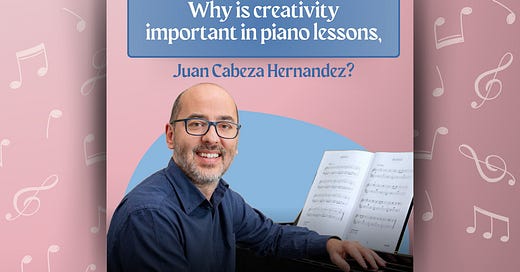



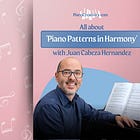
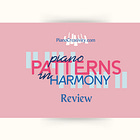



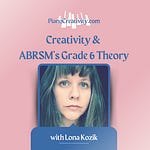




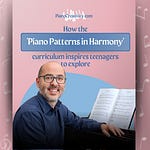
Share this post